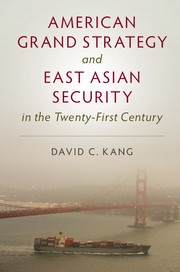Description
American Grand Strategy and East Asian Security in the Twenty-First Century
Author: Kang David C.
David C. Kang tells an often overlooked story about East Asia's 'comprehensive security', arguing that American policy towards Asia should be based on economic and diplomatic initiatives rather than military strength.
Language: English
Subject for American Grand Strategy and East Asian Security in the...:
Approximative price 31.58 €
In Print (Delivery period: 14 days).
Add to cart
American Grand Strategy and East Asian Security in the Twenty-First Century
Publication date: 10-2017
Support: Print on demand
Publication date: 10-2017
Support: Print on demand
Approximative price 80.21 €
In Print (Delivery period: 14 days).
Add to cart
American Grand Strategy and East Asian Security in the Twenty-First Century
Publication date: 10-2017
Support: Print on demand
Publication date: 10-2017
Support: Print on demand
Description
/li>Contents
/li>Biography
/li>
East Asia is richer, more integrated and more stable than ever before, whilst East Asian defense spending is now roughly half of what it was in 1990 and shows no sign of increasing. There is no evidence of any Asian arms race. All countries in the region are seeking diplomatic, not military solutions with each other. Yet this East Asia reality still runs counter to a largely Western narrative that views China's rise as a threat and the region as increasingly unstable. In this important book, David C. Kang argues that American grand strategy should emphasize diplomatic and economic relations with the region, rather than military-first policies. Using longitudinal and comparative data, statistical analysis, and intensive research in selected East Asian countries, he suggests that East Asia is in sync with the American desire to share burdens and that the region may in fact be more stable than popularly believed.
1. Comprehensive East Asian security; 2. The size of the fight in the dog: costly signals in international bargaining; 3. No arms race: military expenditures in East Asia and Latin America; 4. North Korea: costly signals and a willingness to fight; 5. South Korea: desiring good relations with China; 6. Philippines foreign policy: cheap talk about a free ride; 7. Vietnam: who's chasing whom in Vietnam–US relations; 8. Comprehensive security in Japan, Indonesia, Singapore, and Australia; 9. Powerful patron: America's changing relations with East Asia; 10. A minimalist American grand strategy towards Asia.
David C. Kang is Professor of International Relations and Business at the University of Southern California. He is author of numerous books, including Crony Capitalism: Corruption and Development in South Korea and the Philippines (Cambridge, 2008) and East Asia Before the West: Five Centuries of Trade and Tribute (2012). A regular consultant for US government agencies and the military, he has written for the New York Times, the Financial Times, the Washington Post, and the Los Angeles Times, and appears regularly in media such as CNN, BBC, and NPR.
© 2024 LAVOISIER S.A.S.




